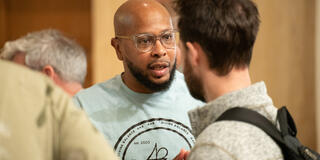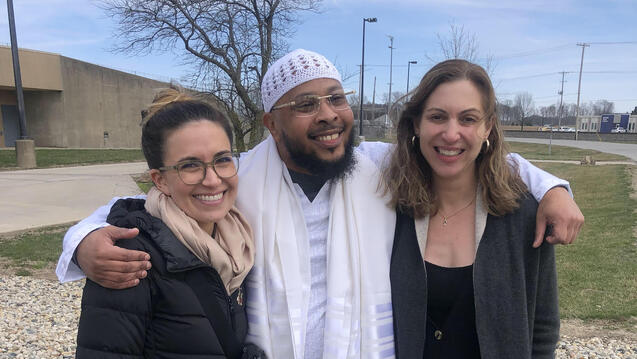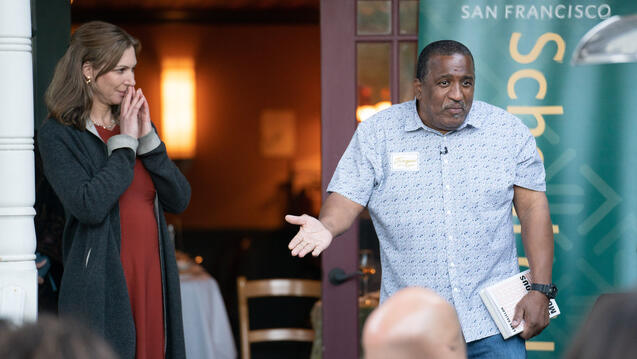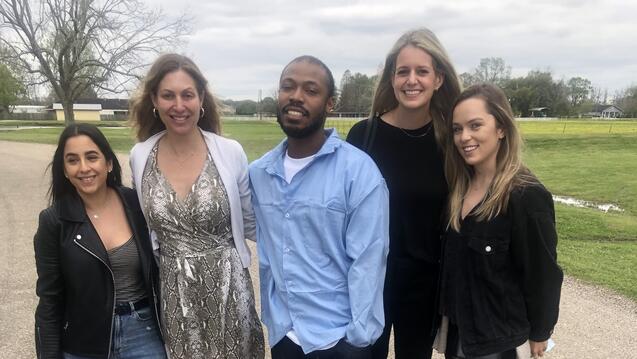After 25 Years in Prison, Justice

“Maybe this prison cell isn’t just a cell. Maybe it’s a university.”
Leon Benson described the awakening he had in prison to more than 100 people at the University of San Francisco School of Law Barnett Lecture on Sept. 21.
Benson was freed seven months ago after a judge found, in a case brought by the School of Law’s Racial Justice Clinic, that Benson did not commit the murder for which he was convicted.
While in prison, Benson went from feeling angry — “I could have defeated myself because I was enraged” — to being hopeful, he said. “I learned about existentialism. The philosophers I read became my professors in solitary confinement.” He’s now majoring in philosophy at Wayne State University in Detroit.
A Panel of Advocates
At the USF event, Benson joined a panel of people who worked for his freedom: USF Law professors Lara Bazelon, director of the Racial Justice Clinic, and Charlie Nelson Keever; Kolleen Bunch, sister of murder victim Kasey Schoen; Kelly Bauder, co-director of the Marion County, Indiana, Prosecutor's Office Conviction Review Unit; and Shannon Coleman, who became a self-described “truth warrior” after a man was wrongfully convicted of her great-aunt’s murder.
Coleman, who said she is on the lookout to help wrongly convicted prisoners, noticed a Facebook petition created by Benson’s sister. At first, Coleman said, she couldn’t believe Benson had been convicted at all, saying the evidence against him was “laughable, ridiculous.”
When Coleman learned that Benson needed letters for an upcoming clemency hearing, she immediately wrote one. It made its way into Benson’s hands, and the two struck up a correspondence. Coleman spent hours contacting innocence organizations, politicians, and clergy on Benson’s behalf — to no avail.
In desperation, she reached out to Bazelon, whom she’d met during the overturning of Anthony Wright’s conviction for murdering Coleman’s great aunt in Philadelphia.
Bazelon agreed to take the case, turning it over to the faculty, staff, and students of the USF Racial Justice Clinic.
Meanwhile, Bauder, a prosecutor, had been put in charge of an Indiana conviction review unit in April 2021. On April 9, 2021, she received Benson’s case. “I received an email from San Francisco literally when I had his file open on my desk,” she said.
It took both sides to examine the case, Bazelon said. “We were so aligned, despite the fact that we were defense attorneys and she was a prosecutor, that it was surreal.”
Finally, Justice
After working to show the court that justice had been miscarried — the lead detective almost completely ignored the most likely suspect — the team celebrated Benson’s release on March 9, 2023.
Benson said their efforts were “the first time I felt seen, beyond the inmate number and the jumpsuit. They led by the heart. They cared.”
Now, he said, they are like “sisters in my life for good.”
Benson plans to write, record music, and “live my life to the fullest” after earning his degree.


